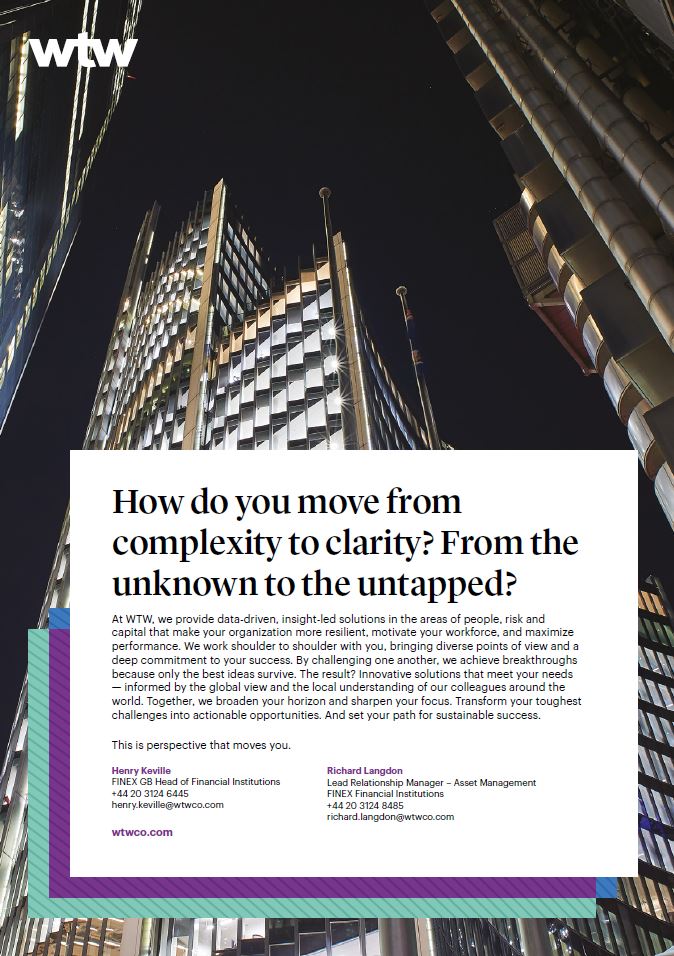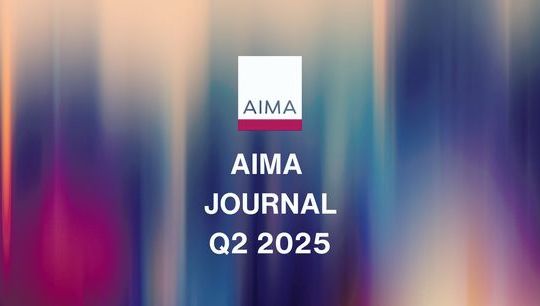Greenwashing, financial institutions and securities actions in the English courts - only a question of time
By Richard Langdon; Kelly Wilcox , WTW
Published: 18 March 2024
As society gravitates toward a more sustainable future, the issue of greenwashing is established as a prominent concern within the financial services industry. With the signing of the Paris Agreement and the UK’s commitment to achieving net zero by 2050, the demand for Environmental, Social, and Governance (ESG) products and investments has seen significant growth. However, as the spotlight has intensified, financial institutions have found themselves facing increased scrutiny from regulators, shareholders, and customers regarding their ESG credentials. It is therefore vital to understand the implications of greenwashing and why financial institutions should be wary.
What is greenwashing?
The Financial Conduct Authority (FCA) defines financial greenwashing as “marketing that portrays an organisation’s products, activities or policies as producing positive environmental outcomes when this is not the case”.1 The Securities and Exchange Commission defines it as “overstating or misrepresenting the ESG factors considered or incorporated into portfolio selection”.2 The European Parliament defines it as “the practice of gaining an unfair competitive advantage by marketing a financial product as environmentally friendly when in fact basic environmental standards have not been met”.3
Greenwashing is a complex issue but is essentially an unsubstantiated or false claim that a company’s policies, products or services are environmentally friendly. This can result in individuals being misguided into believing that products or services are more environmentally friendly than they claim to be and ultimately serves to undermine trust and confidence in ESG products.
Why should financial institutions be alert to this risk?
In today’s climate, financial institutions are a growing target for litigation as they are increasingly seen as being financial enablers to fossil fuel companies through their stewardship role. Last year a French bank was served with a notice that a Non-Governmental Organisation (NGO) would take legal action if it did not change its policies and stop financing fossil fuel expansion. This was the world’s first climate lawsuit against a commercial bank.
This appears to be that start of things to come, with The Australian Securities & Investment Commission (ASIC) commencing its first legal action concerning greenwashing, against a pension fund, alleging that the fund misled members about the sustainability claims of some of the investment options. ASIC later went on to file a lawsuit against an investment company’s Australian arm in August 2023, alleging that research was not undertaken in regard to a significant proportion of the issuers of the bonds.4
An increase in ESG related raids and investigations
Until the matter concerning the French bank, there had historically been an absence of litigation in this area. There had however been an increase in ESG related raids and investigations, with particular emphasis on greenwashing practices, with financial institutions coming under increasing scrutiny from regulators:
In 2022, German police raided the offices of a German asset management company accused of having made misleading statements in its 2020 annual report regarding claims that half the group’s assets were invested using ESG criteria. That led to both litigation and regulatory investigations – a fine of USD 19 million was levied by the US Securities and Exchange Commission (SEC) regarding ESG misstatements.5
In the UK, non-financial regulators are also taking steps and in October 2022, the Advertising Standards Authority ruled that a bank had engaged in greenwashing by misrepresenting its green credentials.6 This ruling was interesting as it focused on what was not said, rather than what was said in the advertisement.
October 2022 in Canada also saw an investigation commenced by the Competition Bureau into a bank for “alleged deceptive marketing practices”.7
The UK Parliament has also stepped in, with The Treasury Select Committee posing questions to the FCA as to what enforcement work it would be doing to target funds who are misleading customers.8
Financial products that are marketed as sustainable should do as they claim
The FCA has responded by putting into place new Sustainability Disclosure Requirements (SDR), with the aim that financial products do as they claim, and that there is evidence to support this.9 The package of measures includes an anti-greenwashing rule which requires that statements concerning sustainability are clear, fair, and not misleading.
- The package of measures will also include:
- Four labels to help consumers navigate the investment product landscape.
- Naming and marketing rules for investment products to ensure sustainability related terms are accurate.
- Consumer facing information to provide consumers with better, more accessible information to help them understand key sustainability features.
- Detailed information in pre-contractual, ongoing product-level, and entity-level disclosures, targeted at institutional investors and consumers seeking more information.
- Requirements for distributors to ensure that product-level information (including the labels) is made available to consumers.10
Investment labels, naming and market rules will apply to UK asset managers, whereas anti-greenwashing rules will apply to all FCA authorised firms who claim their products or services are sustainable.
However, whilst these measures go some way to making it clearer for consumers, there is no provision for redress for consumers who are misled by companies as to a fund’s green credentials. Harriet Baldwin MP said that “Consumers who invested in funds believing they were doing their bit to save the planet must not be made to bear the cost of moving if they find out their fund isn’t so green after all…Without a comprehensive cost-benefit analysis, the regulator’s proposals are lop-sided.
Further work on what the costs are going to be, who will pay, and how the regulator will enforce the rules is clearly necessary”.11
It is likely that investigations from regulators are likely to increase given greater regulatory oversight. The FCA has now issued a policy statement (PS23/16) on the SDR rules, with the anti-greenwashing rule taking effect from 31st May 2024 and the remaining SDR components coming into force in stages from 31st July 2024.
In the meantime, whilst these new measures are in their infancy and yet to be tested, shareholder activism is on the rise and in light of recent measures, shareholders are now more likely to scrutinise a company’s ESG strategy.
There are many avenues where potential claims could be pursued. However, for the purposes of this article we will focus on one, that being claims brought under the Financial Services and Markets Act 2000 (FSMA).
Section 90 and Section 90A Claims under Financial Services and Markets Act 2000 (FSMA)
The risk of shareholder action and regulatory investigations concerning greenwashing is a significant risk for financial institutions. In addition to customer allegations, financial institutions could see claims brought by their own investors under Sections 90 and/or 90A FSMA.
Section 90 provides shareholders with a statutory right to seek remedy for any loss suffered where “untrue or misleading statements” are made in a prospectus or where information is omitted. Any omissions must concern information that investors would reasonably expect to see in a prospectus.
Greenwashing claims could well be made under Section 90 especially where generalised green statements are made by companies concerning green credentials or where there is a lack of oversight concerning various aspects of a company’s supply chain. Section 90 puts the burden on the defendant to prove they were not negligent and under Schedule 10(2), it is enough to show that the defendant “reasonably believed…that the statement was true and not misleading”. Section 90 claims may also be brought against directors as well as the issuer (and potentially other people responsible for the prospectus), while Section 90A claims may only be brought against the issuer of the securities.
Section 90A has a broader application and could have wider implications when it comes to ESG related statements and greenwashing allegations. Claims can be brought under this section for statements made in all publications made to the market as a whole and are not limited to statements made in a prospectus alone.
However, the threshold for Section 90A claims is more akin to recklessness. Therefore, there is only liability if the person responsible for making the statements knew, or was reckless as to whether, the statement was untrue or misleading.
Both Section 90 and Section 90A claimants will be required to show that they have suffered financial loss as a result of the false or misleading statements. The claim cannot succeed purely on the basis of ethical or moral grounds.
What do financial institutions need to do?
Given existing legislation concerning financial misstatements, the current regulatory and litigation landscape, and the emergence of reporting and disclosure requirements, financial institutions should be mindful of all communications made where a statement relating to sustainability is made.
Financial institutions need to ensure that communications are “clear, fair and not misleading” and are “proportionate and not exaggerated”. They should also ensure that their business operations, including all subsidiaries, are compliant with the regulations and disclosure requirements. To do this they should ensure that there is regular reporting and monitoring throughout the business and all subsidiaries.
We will continue to monitor this area, with particular focus on how this plays out in the courts as well as how the “clear, fair and not misleading” test is to be applied.
1 Financial Conduct Authority, 2018, Climate Change and Green Finance, Discussion Paper DP 18/8, Page 10, Para 4.7
2 US Securities and Exchange Commission, 2022, Examination Priorities, Division of Examinations, Page 13
3 European Union, 2020, Regulation (EU) 2020/852 of the European Parliament and of The Council of 18 June 2020 on the establishment of a framework to facilitate sustainable investment, and amending Regulation (EU) 2019/2088, Official Journal of the European Union, Para 11
5 https://www.sec.gov/news/press-release/2023-194
6 https://www.asa.org.uk/rulings/hsbc-uk-bank-plc-g21-1127656-hsbc-uk-bank-plc.html
9 FCA,2023, Sustainability Disclosure Requirements (SDR) and investment labels, Policy Statement PS23/16, Page 1
10 Ibid, page 7
11 (n 8)









